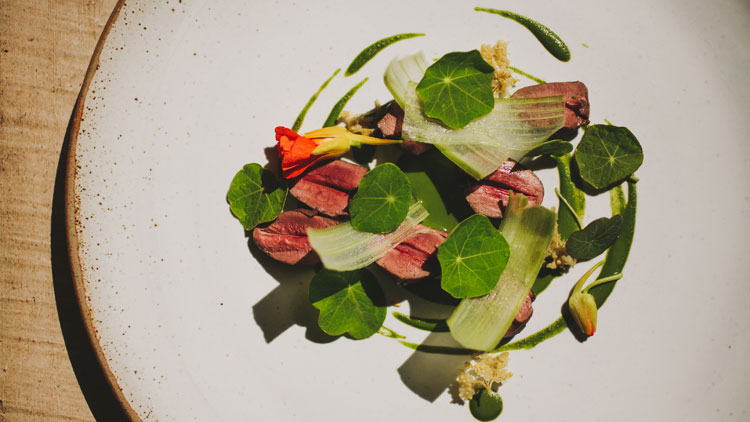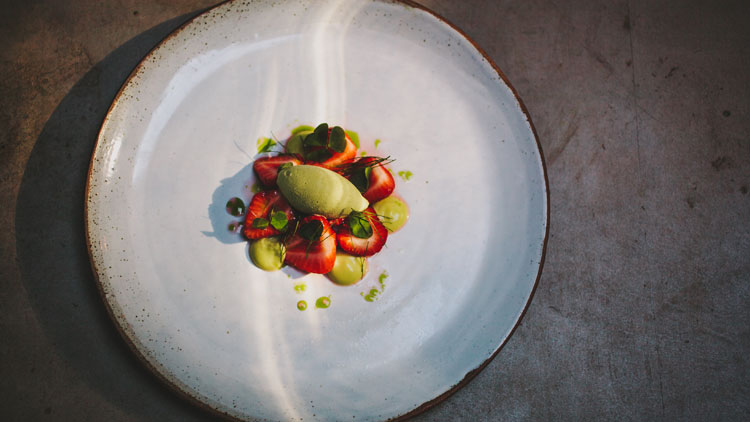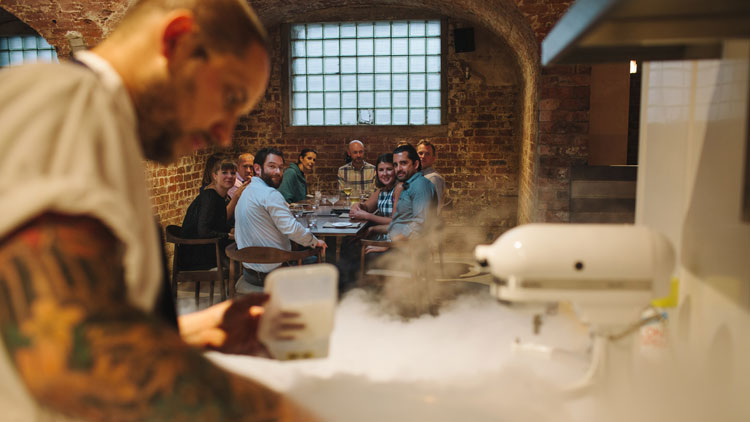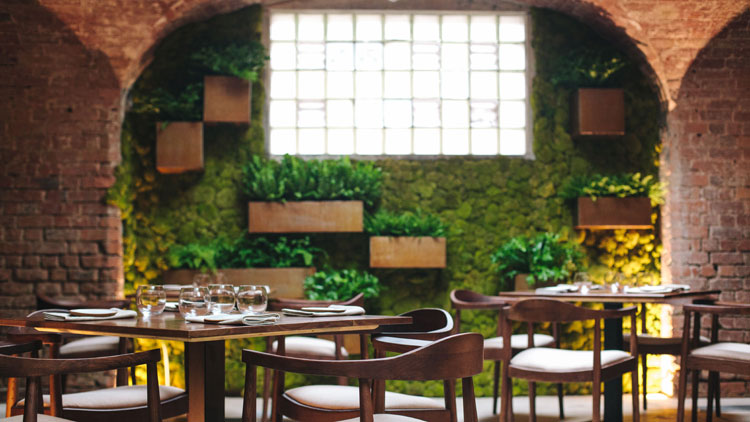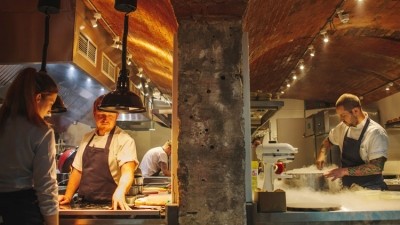Alex Bond on running Nottingham's Alchemilla, Sat Bains and plant-based menus
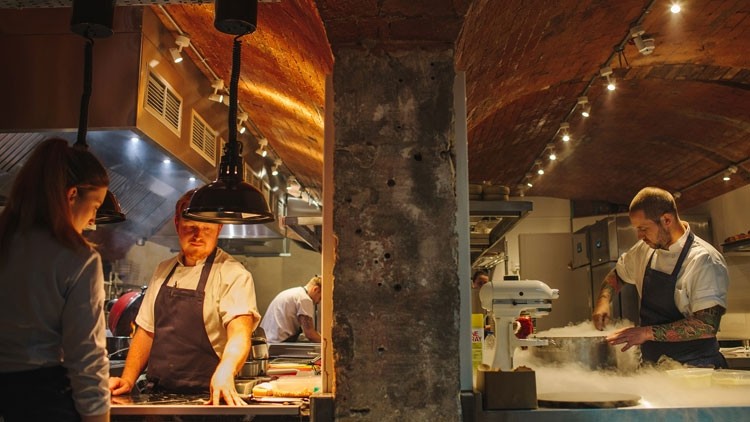
When Alex Bond opened Alchemilla on the edge of Nottingham city centre last August, his debut solo venture was already widely anticipated. A month earlier, all the weekend tables for the first three months had already been snapped up and the local press had whipped up a frenzy around Bond, largely due to his attributed status as the protégé of the highly-revered Nottingham favourite Sat Bains.
“The way people talk, it’s as if I walked out of his kitchen straight into here, but that’s not what happened at all”, muses the 35-year-old chef, snug in a woolly jumper sitting up at the bar as he chats and occasionally answers the office phone, covering for the front-of-house manager who is on paternity leave. In fact, there were eight years in between leaving Bains’ eponymous two-Michelin starred restaurant and starting Alchemilla and he’s not at all keen on the mantle of protégé.
Nevertheless, his link with Nottingham’s most famous chef has certainly helped, both by association and experience. With Alchemilla, the city has welcomed yet another high-reaching and ambitious restaurant to its ranks and a chef out to show that there’s plenty of room for more Michelin stars in the city.
Set in a 150-year-old former coaching inn in the university area of Nottingham that had lain empty for some 100 years, the venue for Bond’s venture matches his ambition. The cavernous dining room is bold and spacious and feels a world away from many of the city’s other fine-dining establishments. Given the building’s age and condition, refurbishment wasn’t cheap, and while Bond is cagey about revealing figures he confirms he spent £85,000 more than anticipated.
The result, however, is a bright space with an open kitchen, exposed brickwork and arches, brushed aluminium, bookcases lined with Bond’s own cookbook collection, jars of foraged ingredients and a living wall of moss to the rear. Massive windows let in shafts of light throughout the 56-cover dining room – 48 in the restaurant and eight at the obligatory kitchen table – creating a space that feels part Noma (in its original form), part underground den. It’s a striking and beautiful restaurant by anyone’s standards.
Life under Bains
Bond’s time at Restaurant Sat Bains was formative. What he learnt most, he says, was “how to construct a menu and to relentlessly question everything”. Bains, he says, “had an insatiable hunger”, that he found infectious.
“He was like a whirlwind in the kitchen. He encouraged us not to look at a menu as a number of random dishes but as a series of carefully constructed dishes that work together. It’s like your favourite album with 12 tracks that flow. It wouldn’t be as good if the tracks were in a different order”.
In Bains’ ‘intense’ kitchen, Bond also learnt to ‘taste, taste, taste’ and to never accept what he’d done was perfect. “It might actually be perfect, but don’t ever draw a line under it. Always think ‘can it be improved upon’?” was the mantra drilled into him.
Yet, when it came to constructing the menus at Alchemilla, it was his home cooking that proved the biggest influence. Around five years ago, he says he became increasingly disenchanted with cooking meat at home and decided to lead a more plant-based diet. “I was just eating shit – a chicken breast with something, and I thought I wouldn’t serve this in the restaurant.” So he started to eat a lot less meat and cooking more vegetarian and vegan dishes, a philosphy he has brought to his first solo project.
Menus are vegetable leaning and there are separate vegetarian and vegan menus. Alchemilla serves tasting menus only, but Bond prides himself on being “super flexible” so everyone on the table doesn’t have to order the same number of courses. Is it annoying having to send dishes out at different times from different menus? “I’m not precious about it, I’m not precious about anything,” he says. “I always wanted to create a restaurant that’s accessible to everyone – very relaxed and informal.”
The tasting menus are competitively priced at £40 for five, £50 for seven and £65 for 10 courses, with wine pairings at £30, £40 and £55 respectively, and rife with voguish ingredients as well as vegetables used in desserts (there is a yeast brûlée and an artichoke pudding). Impressively, each menu differs almost entirely, with either very few repetitions, or ingredients used in different ways.
So the five-course menu might feature squid carbonara; risotto and 36-month parmesan; and brill with potato, smoked eel and oyster sauce, while the seven-course menu could include sea trout with chamomile and bergamot; mussels, potato and garlic; and hogget, onions and curd. The 10-course menu might offer barbecue shiitake with cured pork fat; duck yolk with salt ’n’ vinegar rice; pork jowl with kimchi and peanut; and potato terrine with smoked eel and oyster.
Alchemilla’s menus certainly stand out, but there’s more to the restaurant than just the food, Bond insists. He believes it is the atmosphere of the restaurant as well as its approach, including its price point, that sets it apart from others, including that of his Nottingham mentor’s.
“Sometimes the chat and music are so loud I can’t hear myself speak. Sometimes its quieter. It depends on the crowd. In that sense, the atmosphere is more like a pub.”
Indeed, Alchemilla has fitted in nicely with Nottingham’s growing restaurant scene, a point emphasised by the recently resurrected Nottingham Restaurant and Bar Awards. “For a city of its size, compared with York or Leeds, it definitely has a lively restaurant scene,” he says.
Building a career up north
Hailing from York, Bond regularly cut catering college to work pretty much full time at modern British restaurant Melton’s. From there he headed to Leeds to work for Jeff Baker at 42 The Calls, before moving to of-the-moment chef Anthony Flynn’s Anthony’s in Leeds, when it was “in its glory days”, he emphasises.
It was Bains that eventually brought him to Nottingham, however, following a memorable meal Bond and his now wife Anna had there. “We had a beer with the guys (who worked there) after and Sat gave us a lift back to our hotel,” he recalls. “It was so good, I booked for lunch the next day.”
It seemed only natural that on leaving Anthony’s Bond wrote to Bains saying he wanted a job. Following a successful trial he started there as a junior sous, leaving as a chef de partie three and a half years later at 27-years-old.
On leaving Restaurant Sat Bains – “I did my time, I got what I wanted to out of it and didn’t want to get stuck” – he went to Auberge du Lac as sous chef under Phil Thompson and then to Turners in Birmingham under Richard Turner. His wife, in the meantime, had started a horticultural degree locally so they continued to live in Nottingham, which meant a long weekly commute for Alex.
It was around four years ago he started thinking about opening his own restaurant: “Who doesn’t want that total creative freedom?” he asks. When he finally handed his notice in at Turners two years before Alchemilla opened, his original plan was to look for an existing restaurant, a little place in Nottingham where he could modernise the kitchen and renovate the dining room.
In the first instance he worked for his old friend Tony Parkin at The Wild Rabbit in the Cotswolds town of Kingham, in Oxfordshire, during the week and ran pop-up restaurants on weekends to try and advertise and gather support for a new venture. This took him round the country to Edinburgh, Manchester, Brighton, York and Newcastle, until eventually he landed a regular spot at Wired coffee shop in the trendy Hockley area of Nottingham.
On their first night, at the end of 2015, only 12 people were booked in and 10 of these were invited friends. “Only two were paying customers and they still come [to Alchemilla] today," reveals Bond. Within three months though, they were fully sold out every weekend and by then he had found the Alchemilla site, albeit one that was a world away from his original vision.
Then one night a couple came into Wired on a last minute Facebook cancellation. After eating and taking a look at one of Bond’s flyers asking for investment to fund his new permanent restaurant project, they decided to invest. Other backers in Alchemilla include a family member and Bond’s best mate.
From chef to restaurateur
So has opening his own restaurant been everything he thought it would be? “You can’t fully prepare yourself for the admin side of things, which takes you out of the kitchen,” he responds. But he’s quickly learnt that Tuesday, when there’s no lunch service, is the day to get the admin done so he can try to be in the kitchen every other day.
“There’s a danger at first that you want to do everything yourself. I was trying to take over the front of house but I’ve learnt to delegate, so I don’t come in on my days off. I don’t let it take over.”
He seems genuinely surprised by how busy the restaurant’s been since launch. “We opened and had to deal with the massive amount of people coming, which we just weren’t ready for. I was always waiting for when we wouldn’t have enough people in, but that’s just never happened.”
To meet the unforeseen demand, Bond has been forced to hire more staff. The kitchen started off with a brigade of five but now has seven chefs and is looking for an eighth. The front of house team, meanwhile, has doubled from three to six.
Chefs often deliver their own food to the tables which has helped keep front of house numbers down. This isn’t done so that chefs can suck up applause at the end of the meal, Bond insists, but for practical reasons. “The diners love meeting the chefs, all of them, not just me. Most of them don’t know who I am.”
The restaurant gets a lot of old regulars from the supper club, but one person who’s been noticeably absent is his old boss. “I haven’t seen Sat,” he says, a touch defensively. “If he wants to come in, that would be lovely, but I’m not pining the loss.”
Overall, he’s happy with how Alchemilla is fitting into the Nottingham scene so far. If being oversubscribed is stressful, he’s hiding the strain well. “We’re busy, we can pay our staff, we cook what we enjoy cooking and the customers enjoy eating it. What’s not to love?”
And what of those Michelin stars that Alchemilla clearly looks to be reaching for, and which many believe are within its grasp? “I don’t care if Michelin comes” he starts off saying in the metronomic way all chefs now speak of stars, before checking himself. “Well, I care a little bit. But I just want to enjoy it.”
This is a web version of an article that first appeared in the May issue of Restaurant magazine, the leading title for the UK's restaurant industry. For more features, comment, interviews and in-depth analysis of the restaurant sector subscribe to Restaurant magazine here.
